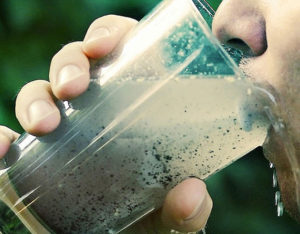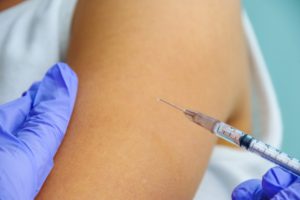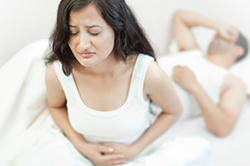Overview

Typhoid fever is a serious bacterial (Salmonella typhi bacteria) infection that easily spreads through contaminated water and food. Although it is rare in developed countries, still a serious health threat in the developing world, especially for children.
Typhoid fever is highly contagious. An infected person can pass the bacteria out of their body in their poo (stools) or, less commonly, in their pee (urine). If someone else eats food or drinks water that's been contaminated with a small amount of infected poo or urine, they can become infected with the bacteria and develop typhoid fever. Along with high fever, the acute illness is characterized by prolonged headaches, nausea, loss of appetite, constipation, or sometimes diarrhea. Symptoms are often non-specific and clinically non-distinguishable from other febrile illnesses.
With treatment, most people make a full recovery. But untreated typhoid can lead to life-threatening complications. Most people who have typhoid fever feel better a few days after they start antibiotic treatment, but a small number of them may die of complications.
Vaccines against typhoid fever are only partially effective. Vaccines are usually reserved for those who may be exposed to the disease or traveling to areas where typhoid fever is common. According to the most recent estimates, between 11 and 21 million cases and 128,000 to 161,000 typhoid-related deaths occur annually worldwide.
In terms of prevention, WHO further recommends that all typhoid fever vaccination programs should be implemented in the context of other efforts to control the disease, including health education, water quality and sanitation improvements, and training of health professionals in diagnosis and treatment.
Symptoms
People usually have a sustained fever that can be as high as 39–40°C. Some people with typhoid fever develop a rash of flat, rose-colored spots. Signs and symptoms are likely to develop gradually — often appearing one to three weeks after exposure to the disease.
Other symptoms of typhoid fever and paratyphoid fever are shown below:
- - Fever that starts low and increases daily, possibly reaching as high as 40.5 C
- - Headache
- - Weakness and fatigue
- - Muscle aches
- - Sweating
- - Dry cough
- - Loss of appetite and weight loss
- - Stomach pain
- - Diarrhea or constipation
- - Rash
- - Extremely swollen stomach
Without treatment, it can be developed into the later stage, which may:
- - Become delirious
- - Lie motionless and exhausted with your eyes half-closed in what's known as the typhoid state
*Life-threatening complications often develop at this time.
In some people, signs and symptoms may return up to two weeks after the fever has subsided.
Treatment
 The most important point is to see a doctor immediately if you think you might have typhoid fever. The only way to know if an illness is typhoid fever or paratyphoid fever is to have a blood or stool (poop) sample tested for Salmonella Typhi or Salmonella Paratyphi. If you get consulted with a doctor who focuses on international travel medicine or infectious diseases, medical professionals may be able to recognize and treat your illness more quickly.
The most important point is to see a doctor immediately if you think you might have typhoid fever. The only way to know if an illness is typhoid fever or paratyphoid fever is to have a blood or stool (poop) sample tested for Salmonella Typhi or Salmonella Paratyphi. If you get consulted with a doctor who focuses on international travel medicine or infectious diseases, medical professionals may be able to recognize and treat your illness more quickly.
In terms of treatment, Typhoid fever and paratyphoid fever are treated with antibiotics. If typhoid fever is diagnosed early, the infection is likely to be mild and can usually be treated at home with a 7- to 14-day course of antibiotic tablets. More serious cases of typhoid fever usually require hospital admission so antibiotic injections can be given. With prompt antibiotic treatment, most people will start to feel better within a few days and serious complications are very rare. Deaths from typhoid fever are now virtually unheard of in many countries.
It is essential to know that the danger from typhoid fever doesn’t end when symptoms disappear. Even if your symptoms seem to go away, you may still be carrying Salmonella Typhi. If so, the illness could return, or you could pass the bacteria to other people. If you are a healthcare worker or work at a job where you handle food or care for small children, you may not be able to return to work until a doctor has determined you no longer carry the bacteria.
If you are being treated for typhoid fever or paratyphoid fever, it is important to do the following to lower the chance that you will pass the bacteria on to someone else.
- - Keep taking antibiotics for as long as the doctor has recommended.
- - Wash your hands carefully with soap and water after using the bathroom.
- - Do not prepare or serve food for other people.
Causes and Risk factors
1. Causes and infection route
Typhoid fever is caused by dangerous bacteria called Salmonella typhi. Most people in developed countries pick up typhoid bacteria while they're traveling. Once they have been infected, they can spread it to others through the fecal-oral route. This means that Salmonella typhi is passed in the feces and sometimes in the urine of infected people. If you eat food that has been handled by someone who has typhoid fever and who hasn't washed carefully after using the toilet, you can become infected. In developing countries, where typhoid fever is established, most people become infected by drinking contaminated water. The bacteria may also spread through contaminated food and direct contact with someone infected. Even after antibiotic treatment, a small number of people who recover from typhoid fever continue to harbor the bacteria. These people, known as chronic carriers, no longer have signs or symptoms of the disease themselves. However, they still shed the bacteria in their feces and are capable of infecting others.
2. Risk factors
Typhoid fever is a serious worldwide threat and affects about 27 million or more people each year. The disease is established in India, Southeast Asia, Africa, South America and many other areas. Worldwide, children are at the greatest risk of getting the disease, although they generally have milder symptoms than adults do. The areas with the highest rates of typhoid fever are:
- • the Indian subcontinent
- • Africa
- • south and southeast Asia
- • South America
When traveling to a foreign country, it's a good idea to make a list of relevant contact details and telephone numbers in case of an emergency.
Intestinal bleeding or holes in the intestine are the most serious complications of typhoid fever. They usually develop in the third week of illness. In this condition, the small intestine or large bowel develops a hole. Contents from the intestine leak into the stomach and can cause severe stomach pain, nausea, vomiting and bloodstream infection (sepsis). This life-threatening complication requires immediate medical care.
- • Inflammation of the heart muscle (myocarditis)
- • Inflammation of the lining of the heart and valves (endocarditis)
- • Infection of major blood vessels (mycotic aneurysm)
- • Pneumonia
- • Inflammation of the pancreas (pancreatitis)
- • Kidney or bladder infections
- • Infection and inflammation of the membranes and fluid surrounding your brain and spinal cord (meningitis)
- • Psychiatric problems, such as delirium, hallucinations and paranoid psychosis
With quick treatment, nearly all people in industrialized nations recover from typhoid fever. Without treatment, some people may not survive complications of the disease.
Prevention
 Safe drinking water, improved sanitation and adequate medical care can help prevent and control typhoid fever. Unfortunately, in many developing nations, these may be difficult to achieve. For this reason, some experts believe that vaccines are the best way to control typhoid fever. Thus, a vaccine is recommended if you live in or are traveling to areas where the risk of getting typhoid fever is high.
Safe drinking water, improved sanitation and adequate medical care can help prevent and control typhoid fever. Unfortunately, in many developing nations, these may be difficult to achieve. For this reason, some experts believe that vaccines are the best way to control typhoid fever. Thus, a vaccine is recommended if you live in or are traveling to areas where the risk of getting typhoid fever is high.
The 2 main vaccines available to prevent typhoid fever are:
- • Vi vaccine – given as a single injection
- • Ty21a vaccine – given as 3 capsules to take on alternate days
As the Ty21a vaccine contains a live sample of Salmonella typhi bacteria, it isn't suitable for people with a weakened immune system – for example, people receiving certain types of treatment, such as chemotherapy. It also isn't usually recommended for children under 6, whereas children can have the Vi vaccine from 2 years of age. It's unclear whether the Vi and Ty21a vaccines present a risk to pregnant or breastfeeding women. But vaccination should be considered if there's a significant risk of getting typhoid. The typhoid vaccine should ideally be given at least 1 month before you travel, although if necessary it can be given closer to your travel date. Booster vaccinations are recommended every 3 years if you continue to be at risk of infection with typhoid bacteria.
After having the typhoid fever vaccine, some people have temporary soreness, redness, swelling or hardness at the injection site. About 1 in every 100 people have a high temperature of 38C or above.
In BLEZ clinic, Vi vaccine is available, so please call in advance in case you would like to take it.
https://blez-clinic.com/en/immunization/
The vaccines work by stimulating your body to create antibodies (infection-fighting proteins) that prevent you from getting ill if you become infected with typhoid bacteria. But neither typhoid vaccine is 100% effective, so you should always be aware of the guidance as follows:
- • Wash your hands. Frequent hand-washing in hot, soapy water is the best way to control infection. Wash before eating or preparing food and after using the toilet. Carry an alcohol-based hand sanitizer for times when water isn't available.
- • Avoid drinking untreated water. Contaminated drinking water is a particular problem in areas where typhoid fever is endemic. For that reason, drink only bottled water or canned or bottled carbonated beverages, wine and beer. Carbonated bottled water is safer than non-carbonated bottled water.
- • Avoid raw fruits and vegetables. Because raw produce may have been washed in contaminated water, avoid fruits and vegetables that you can't peel, especially lettuce. To be absolutely safe, you may want to avoid raw foods entirely.
- • Choose hot foods. Avoid food that's stored or served at room temperature. Steaming hot foods are best. And although there's no guarantee that meals served at the finest restaurants are safe, it's best to avoid food from street vendors — it's more likely to be infected.
- • Know where the doctors are. Find out in advance about medical care in the areas you'll visit, and carry a list of the names, addresses and phone numbers of recommended doctors.
If you're recovering from typhoid fever, these measures can help keep others safe:
- • Take your antibiotics. Follow your doctor's instructions for taking your antibiotics, and be sure to finish the entire prescription.
- • Wash your hands often. This is the single most important thing you can do to keep from spreading the infection to others. Use hot, soapy water and scrub thoroughly for at least 30 seconds, especially before eating and after using the toilet.
- • Avoid handling food. Avoid preparing food for others until your doctor says you're no longer contagious. If you work in the foodservice industry or a health care facility, you won't be allowed to return to work until tests show that you're no longer shedding typhoid bacteria.

